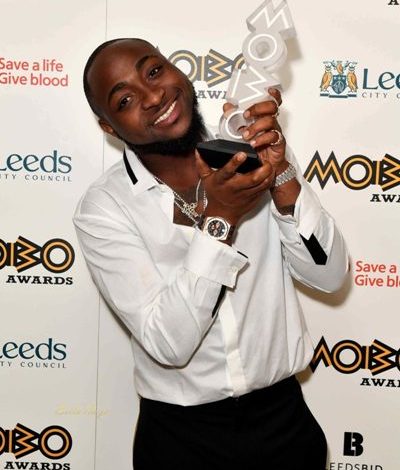
Davido
In a recent interview with Financial Times, multi-award winning Nigerian musician David Adedeji Adeleke aka Davido has revealed how he was able to convince his father to allow him pursue his dream to become a musician.
The 25-year-old Nigerian pop star Davido is now a big star not just in Africa but abroad. He has received numerous awards and his songs have been watched millions of times on Youtbue.
FT revealed that David Adeleke who has won Best African Act at the MTV EMAs will have his 30 Billion tour (which has already covered venues across the US, Spain, Djibouti, Ivory Coast and beyond) in the UK early 2018.
Speaking about his music, he said: “Funnily enough, this is the first time that I’ve won European awards,” says Davido, in sweetly raspy tones. “I realised that when I really focused on Africa and my culture, that’s when people started recognising me. I travel a lot, but I know the kind of environment I need to be in; I’d rather create the music at home, in Lagos. The travelling distracts me, because there’s so much going on.”
In the western music mainstream, the profile of young African talent is soaring. Of course, Africa’s vital influence on, and cross-pollination with, international music scenes, has been deep-rooted over decades; among countless examples are Fela Kuti’s Afrobeat movement and legendary 1970s Lagos tunespot The Shrine, which drew the likes of Paul McCartney to work in Nigeria.
The 21st century has seen collaborative projects such as Africa Express: launched by British musician Damon Albarn, it has connected artists from Mali, Congo, Senegal, the UK and the US. But recent years have also seen the mainstream focus on “afrobeats”: seemingly a catch-all term, yet very distinct from Fela’s polemical grooves.
Afrobeats sounds are fuelled by youth culture and catchy anthems, their vocals and rhythms laced with electronic effects. Some artists have been Brits reflecting their African heritage: take Fuse ODG, whose 2014 debut TINA (This Is New Africa) merged Ghanaian dance roots with western club production, or fellow Londoner J Hus, whose album Common Sense created a buzz this year.
Many others, such as Davido, are Nigerian talents whose success was established well before western attention: D’banj, say, who scored a 2012 hit with “Oliver Twist”, or Wizkid, who raised the roof at London’s Royal Albert Hall in September.
Afrobeats has also notably inspired work by international stars including Beyoncé and Drake. Why is it that the western mainstream has now experienced an awakening?
"It’s the internet and social media,” replies Davido, with the assurance of someone who has Nigeria’s biggest Instagram account (5.5m followers). “I’m telling you, Nigerian people have a supportive force, and an amazing energy. Beyoncé and Kanye felt it on their visits, but Nigeria has always been very big on entertainment; when I was little, a big artist would come over to play every Christmas.
“Now the music industry in Nigeria is like a government ministry; it’s worth billions. There are so many artists in Nigeria that you might not have heard of, but trust me, they’re doing well.”
Davido has never played down his own wealthy background; his 2012 debut album was entitled Omo Baba Olowo (Yoruba for “Son of a rich man”).
He was born in Atlanta, Georgia, to a family of Nigerian entrepreneurs, and he returned to the US to study engineering; when Davido went Awol to pursue music instead, his father was decidedly unimpressed — and had him arrested upon his reappearance in Lagos.
“My dad didn’t like me doing music!” laughs Davido. “If he saw my face on a billboard, he’d arrest everybody at that show! But when I made the song ‘Dami Duro’ [2011], it became the biggest track in Africa; it’s saying: ‘I’m the son of a rich man, you can’t stop me, and people love me.’ It now feels good for dad to see that music can take me this far.”
This multilingual pop wave is arguably pan-African, with artists and fans taking inspiration from countries around the continent; it highlights the rich disparity of African cultures — and the limitations of the “afrobeats” tag.
“In Nigeria, we all mix sounds together and collaborate; it’s natural,” says Davido. He prefers to call his own music “afrofusion”, with elements including hip-hop, Ghanaian high life, South African kwaito, and R&B. “It’s been generalised as afrobeats, but I have songs that sound like afropop, afrotrap . . . ”
Leave a Reply